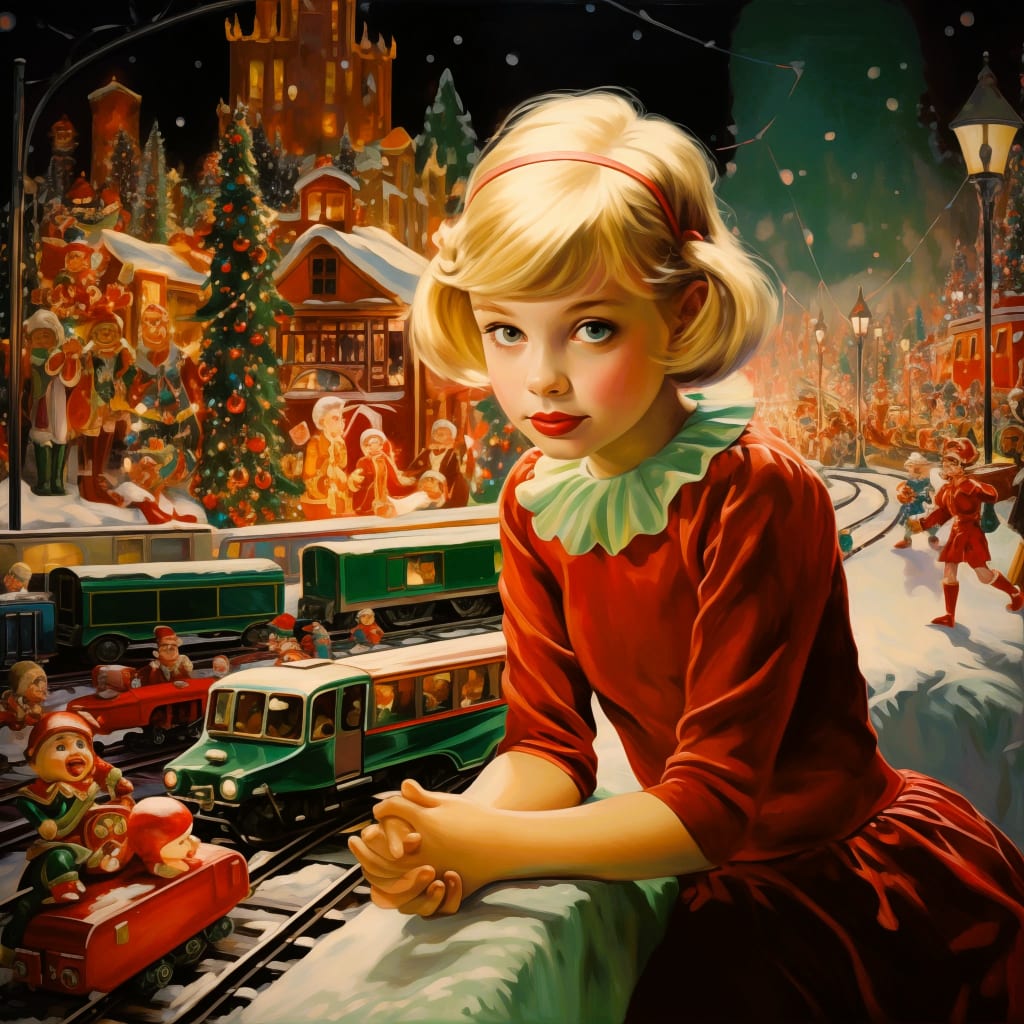Christmas Cozy
Memories of Wonder, Visions of Hope

We are in the midst of what we tend to call "the holiday season." It's a cozy time for many of us - a time when memories of childhood Christmases filled with love and the warm scent of pine awaken our senses. Storefront displays, bright colored lights, and the sounds of the season, both secular and religious, fill us with nostalgia and a sense of being wrapped in loving, protective arms.
Years ago, I was studying Chaplaincy/Spiritual Care at Banner Desert and Cardon Children's Medical Center in Mesa, Arizona. One morning as I walked down the hall in the hospital, I found myself headed straight toward the gift shop. The window was filled with the trappings of Christmas - decorated fir trees, sparkly lights, ribbons, and bows. I had a sudden rush of nostalgia for a time and place that I remembered out of my childhood.
I recalled a trip I took with my mom and grandma to Dayton's Department Store in Minneapolis when I was quite young. The store was decorated with all the trimmings and the window displays facing the street were beautiful. We took the escalators upstairs, where we found an entire room dedicated to Christmas.
A large model train ran around the top of the walls; faux snow and snow-people stood around giant Christmas Trees. Christmas music filled the pine-scented air. I got to see Santa Claus in the center of this wondrous fantasy, assisted by his elves.
This may have been the first year of Dayton's Eighth Floor Holiday Show, which was in 1963. I would have been five years old. My memory supports this, as according to Mill City Times, the theme that year was Santa's Enchanted Forest. I may not recall the details perfectly; I may be conflating two visits to the Eighth Floor, but the memories are clear nonetheless. The nostalgia is powerful.
The feeling of excitement, the sense of being surrounded by beauty and wonder, and the comfort of knowing I was truly loved filled me for the rest of that day.
The reason for the season
Some Christians argue that "Jesus is the Reason for the Season." The factual, scientific reason for the season has to do with the path of the sun in the sky. In the Northern Hemisphere, the sun is farthest south around December 21. The sun travels the shortest path through the sky, making the 21st the shortest day and the longest night. This is called the Winter Solstice. In the Southern Hemisphere, the opposite is true, making this day the longest day and the shortest night. In the Southern Hemisphere, December 21 is the Summer Solstice. The Solstices have been celebrated since the beginning of human awareness.
Though it is Summer Solstice in the Southern Hemisphere, Christmas is still celebrated on December 25, making it a summer holiday. Christians in Australia will be found celebrating with a barbecue or a beach party rather than around a blazing fireplace. Jesus is the reason for Christmas and a reason for the giving of gifts and the singing of carols, but he is not the reason for this entire season. In fact, as many have argued, Jesus was more likely to have been born at another time of year. There are Christian denominations which choose not to celebrate Christmas at all because of this.
In the Northern Hemisphere, the calendar from Autumn through Spring is replete with Festivals of Light. Like Christmas, many of them have become intertwined with the Winter Solstice. This fact makes it important to recognize that not everyone who is out shopping at this time of year celebrates Christmas. Perhaps they have recently celebrated Diwali or Hanukkah.
Perhaps they are honoring Kwanzaa or are looking forward to the Chinese New Year. It's possible that they are celebrating the pagan Yule or even the Solstice itself, either as a Pagan or as a non-religious person simply honoring the season. They could be a humanist honoring the secular aspect of all of these as a part of the culture within which they are living. In fact, they might simply not be celebrating at all.
As an Interspiritual Christopagan, I celebrate both Christmas and the Solstice. I tend to call it Yule or Yuletide, a version of the Germanic/Nordic Jul. This word, Yule, is used interchangeably with Christmas, various winter festivals, or as a stand-alone celebration of the Solstice and the returning of the Light.
What we call this time of year
This time of year, we often hear and read cacophonous arguments about what to call it. There are a lot of Christians who insist that everyone from grocery store cashiers to marketers say "Merry Christmas" to all customers. As the United States becomes a more pluralist nation, the greeting "Merry Christmas" shifts to a more appropriate "Happy Holidays" in the marketplace. This shift often comes under attack by certain factions of Christianity that seem to fear change.
If someone wishes me a "Merry Christmas," or a "Blessed Yule," a "Happy Hanukkah," or a "Happy Solstice," I return their blessing with a "You as well!" Sometimes, I simply thank them. No matter what they celebrate at this time of year, I am honored that they chose to wish me a good season.
Working with the public, I wish people a "Happy Holidays." This is not just a "politically correct" way of speaking at this time of year, it is also one of the most respectful way sto greet people we don't know at this time of year. We don't know thier stories, and they may celebrate a different holiday than we do. By saying "Happy Holidays," we acknowledge this time of celebration in a way that will always be correct.
Commercialism
Many people complain about the horrible commercialism of this special time. It is most definitely an overly commercialized time of year. It has been so for a very long time. As long as shoppers continue to line up to purchase products at the department stores, often fighting for popular gift items, it will remain so. As long as people insist on purchasing more than they can afford to buy and pile more gifts under the tree than any one family needs, Christmas will continue to be a "commercial" holiday. Yet, there is positive in that "commercialism," too.
That day at the hospital when I remembered the display at Dayton's, I was filled with a sense of joy, hope, and expectation. I was reminded that there is more to this time of year than rampant commercialism, more than self-righteous religious rhetoric. The symbols, sounds, colors, and smells of Christmas are more than representations of a religious tradition.
They have become traditions of western culture. They are secular traditions that can bring people together, if only we could let go of the semantics of our religious differences.
For many folks, this can be a sad season of loneliness and a reminder of a childhood that was not so good. Those of us for whom the season sparks a pleasant nostalgia would do well to consider this when reaching out to friends and family.
What better time to provide support, comfort, and a listening ear to others, no matter what traditions they happen to follow? Should not this be a time when we see the beautiful Light that is the Hub at the center of the wheel of all religions? Should it not be a time when we who practice spirituality and religions that claim to center on Love actually practice that Love?
For those who do not practice a religious or faith tradition, could it not be a time for respecting and loving one another, just because it's the right thing to do? Sure, it's the right thing to do all year long, and we should practice Love each and every day. However, being human, we often don't.
We need a time of year such as this, to remind us not of what we are, but what we could be.
(c) Suzy Jacobson Cherry
~~~~~
This story has appeared in Brigid's Arrow on Medium and on Newsbreak.
About the Creator
Suzy Jacobson Cherry
Writer. Artist. Educator. Interspiritual Priestess. I write poetry, fiction, nonfiction, and thoughts on stuff I love.






Comments
There are no comments for this story
Be the first to respond and start the conversation.